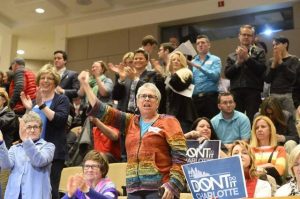Taking “additional steps to ensure the repeal of HB2 would not be jeopardized in any way,” Charlotte City Council voted to fully overturn its dormant non-discrimination ordinance that granted extra protections to members of the lesbian, gay, bisexual and transgender community.

The measure passed 7-2.
LGBT activists spoke out against the call to rescind the non-discrimination ordinance at the Charlotte Government Center during a press conference on Monday.
“The City Council acted in good faith to do everything that it understood was necessary to facilitate the repeal of HB2,” the city said in a statement.
The emergency meeting to discuss the ordinance was announced Wednesday at about 7:45 a.m. — less than three hours before the N.C. General Assembly was set to convene in a special session taking up the repeal of House Bill 2.
While Charlotte City Council made a surprise move Monday in unanimously voting to repeal its ordinance — which passed in February and sparked action by state legislators to pass the controversial law — Republican lawmakers late Tuesday complained the Charlotte measure didn’t go far enough.
In response, council member Ed Driggs sent out a statement late Tuesday night to address media reports that the city’s repeal of its ordinance “only removed part of the ordinance and intentionally left other parts in place.”
“There was no effort on the part of Council to preserve or protect any portion of the City Code that was in conflict with that understanding,” he said. “If the General Assembly needs us to consider doing more, we ask for a clear explanation of exactly what that entails. If necessary, Charlotte City Council will act to address any unintended omissions from the ordinance it passed on Monday.”
North Carolina legislators began meeting in Raleigh shortly after 10 a.m. to reconsider HB2, formally named the Public Facilities and Privacy Security Act.
The piece of legislation was introduced and passed during a one-day special session in late March. It became known as the bathroom bill because of a provision requiring people to use public restrooms in government-owned buildings on the basis of birth gender rather than gender identity. Other provisions of the law prevent the state’s towns and cities from passing non-discrimination ordinances, like the one in Charlotte, and setting their own minimum wage.
The law has led to widespread economic fallout across the state in the form of event cancellations, backlash from corporate leaders and nixed company expansions.
By Jenna Martin
Charlotte Business Journal












